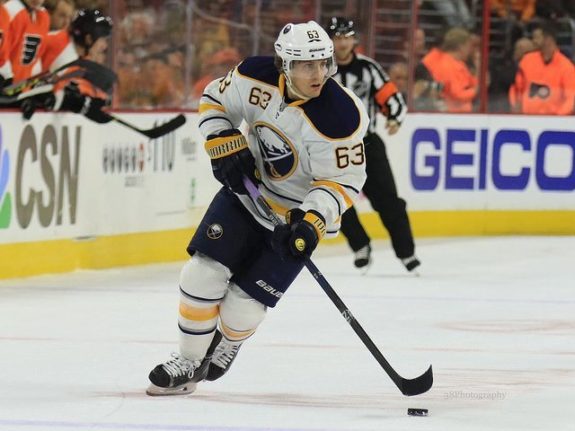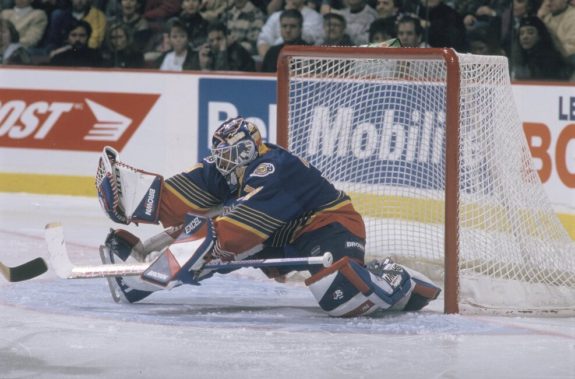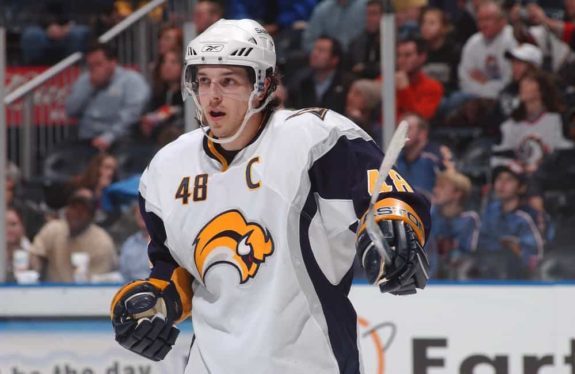Few things are as upsetting in sports as a promising career being cut short by injuries. And due to hockey’s rugged nature, that’s happened more than a few times in NHL history. Every team has a list of players whose potentials weren’t realized because they so often found themselves out of action, and the Buffalo Sabres have certainly had their fair share.
When looking back at former Sabres who were snakebitten throughout their careers, the following five perhaps stand out the most.
5. Tyler Ennis
Compensating for his lack of size with speed and terrific handling, 2008 first-round pick Tyler Ennis made an immediate impact during his rookie 2010-11 season, scoring 29 goals and 49 points to help the Sabres rally to the playoffs. He also scored the overtime winner in the team’s last postseason victory to date (13 years ago for anyone counting). At the time, it looked as if Buffalo’s next big thing had arrived, but that run proved to be as good as it would get.
Ennis missed nearly half of the following season with ankle issues, which was an omen of bad things to come. He stayed healthy over the following three seasons, but unfortunately for him, that was when the Sabres’ downward spiral began. They bottomed out and finished last in the NHL twice in a row in 2014 and 2015, squandering commendable efforts from their top center over that span.

In a bit of irony that feels cruel in hindsight, when the Sabres began to regain themselves after such a plummet, injuries became an issue for Ennis once again, and he never truly regained himself. He missed significant time during the 2015-16 and 2016-17 campaigns, causing his scoring to decrease significantly. In the summer of 2017, the Sabres decided it was time to cut their losses and sent him to the Minnesota Wild in the trade that brought back his former teammate Jason Pominville.
Ennis bounced around over the next seven years, but he was never able to shake the injury bug, which ultimately ended his career in Nov. 2023. In eight years with Buffalo, he produced 236 points in 419 games, but everyone watching knew he was capable of far, far more. Had he played for the Sabres at any other time in their history, he might be remembered as one of the better players in the franchise’s history.
4. Grant Fuhr
The case of Grant Fuhr‘s time with the Sabres remains perplexing even 30 years later. That’s because the Sabres didn’t exactly need him when he was acquired from the Toronto Maple Leafs in February 1993. In exchange for the future Hall of Famer, Buffalo sent a truly preposterous return package to their storied rival: a first-round pick, fellow future Hall of Famer Dave Andreychuk, and goaltender Daren Puppa. The move was difficult enough to justify then and has only grown worse with age.
For starters, Puppa had been perfectly fine between the pipes and was even the Vezina Trophy runner-up in 1990. Also, the Sabres had another goaltender on the roster that they had traded for the summer prior, so why was the move even needed? Adding Andreychuk, one of the best pure goal scorers in the NHL at the time, makes it even more baffling. To make matters worse, the massive investment didn’t pay off for the Sabres, at least in the way it was supposed to.

Fuhr was only with the Sabres for three years and spent most of that time on the sidelines. He helped the team to the postseason in 1993 but missed almost all of the following season due to a severe knee injury (from ‘Knee Injury Forces Fuhr to the Bench,’ The Buffalo News, 11/27/93). It proved serendipitous, however, as it left the Sabres no choice but to turn to the goalie they had traded for in 1992. The rest, they say, is history. Dominik Hasek took the reins and became one of the greatest backstops in hockey history. Suddenly, Fuhr was expendable and was traded to the Los Angeles Kings in February 1995.
Related: Buffalo Sabres’ 3 Best Contracts for 2024-25
Though his time in Buffalo was short-lived, Fuhr played his part for the Sabres. However, it’s truly fascinating to think of how different history would be if he had stayed healthy. If he had, Hasek may never have had the opportunity to establish himself, and the Sabres may have missed out on one of its greatest-ever players. It’s very odd to think of a team somehow benefitting from losing a marquee player to injury, but in this case, the Sabres certainly did.
3. Daniel Briere
This one might seem a bit out of left field, but bear with me for a minute. Despite his short size, Daniel Briere was not frail in the least bit. In fact, he was one of the toughest pound-for-pound players of his era. His three and a half seasons with the Sabres were largely injury-free but with one notable exception. The Quebecois suffered a sports hernia in Jan. 2006 that required surgery, causing him to miss 32 games of what was a legendary season in Buffalo.
You may also like:
- Sabres’ Best Trade Deadline Assets
- 3 Takeaways From the Sabres’ 2-1 Win Over the Devils
- How the Sabres Should Approach the 2026 Trade Deadline
- NHL Morning Recap – February 26, 2026
- Grading the Sabres’ Olympians’ Performances at the 2026 Games
The Cookie Monster was not hindered, however, and still managed to score 25 goals and 58 points in the 48 games he played. Had the injury not occurred and he produced at that rate for a full 82 games, he would likely have broken triple digits in points and may have even been a Hart Trophy candidate. His dominance continued into the postseason and he scored 19 points in 18 games to help the Sabres advance to Game 7 of the Eastern Conference Final. But as phenomenal of a season as it was for Briere, the injury may have cost him more than was originally thought.

Everyone remembers Briere and co-captain Chris Drury’s dramatic departure in the summer of 2007, but what’s forgotten is that the seeds were sown the previous summer, at least for Briere. He became a restricted free agent (RFA) in the 2006 offseason and the stingy Sabres took him to salary arbitration, where he was awarded a $5 million deal for the following season.
After an even more stellar season than the one he had, Briere would have held considerably more power in contract negotiations that summer. The Sabres would have faced far more pressure to sign their top star, which may have swayed them to offer him the long-term contract he so richly deserved. Of course, the likelihood of this is debatable since Briere put up 96 points in 2006-07, and the Sabres still refused to ante up to him, so maybe it wouldn’t have made a difference. Then again, perhaps it would have.
2. Tim Connolly
I’ve talked about Tim Connolly plenty before, but it’s still difficult to understate how big he was for the Sabres and how much bigger he could have been. Thanks to a skill set that allowed him to do essentially anything he wanted, he was a wildly entertaining player to watch. The Sabres hoped to make him a future team centerpiece when he was acquired in exchange for Michael Peca in 2001, but those plans were never able to materialize.
Unfortunately, the Syracuse native was as frail as he was gifted, and injuries haunted him perhaps more than any player in Sabres history. A concussion sustained in a 2003 preseason game put him on the shelf for that entire season, and a hard hit in the 2006 Playoffs led to a herniated disc that kept him out for nearly a full calendar year. In total, ailments limited him to just 464 of a possible 656 games over eight seasons.

It’s truly a shame because, when Connolly was healthy, he was lethal. His abilities set him apart at a time when the NHL hadn’t yet fully transformed into the faster, more agile league it’s known as today, and he was an integral part of the Buffalo teams that were so dominant after the 2004-05 Lockout. He produced several memorable moments over that span, including the tying goal in Game 1 of the 2006 Eastern Conference Semifinal with 10.7 seconds remaining.
As dazzling as Connolly was, Sabres fans could never witness what he was fully capable of; the injuries just didn’t allow it. In a parallel universe where he could stay healthy, he probably would have gone down as one of the best players in team history and may have even had his number retired. Fate can be cruel sometimes, and Connolly knows that better than most.
1. Pat LaFontaine
Pat LaFontaine is already one of the best players in NHL history, but what’s fascinating to think is that he could have been even better. The Hall of Famer electrified Sabres fans of the 1990s and stands as one of the team’s all-time greats despite spending just seven years in Buffalo. If you need proof, look no further than the 1991-92 season, his first with the Sabres, in which he scored 46 goals and 97 points in just 57 games. His sophomore efforts proved even greater, as he recorded 95 assists and 148 points, the latter of which is an NHL single-season record for Americans. It earned him Hart and Lady Byng Trophy nominations.
LaFontaine achieved all of this in spite of injury struggles that may have even put Connolly’s to shame. Knee issues cost him the majority of the next two seasons, but he was undaunted and received the Bill Masterton Trophy in 1995 for his perseverance. However, his Sabres career was ultimately undone in October 1996 when he was severely concussed after being elbowed by Pittsburgh’s Francois Leroux.

It was the fifth concussion of his career, and the Sabres understandably refused to clear him to return, recommending he retire. LaFontaine was determined to continue playing and was traded to the New York Rangers the following offseason, but his stint was short-lived, and he retired in 1999 after another concussion. Thankfully, they seem to have not had drastic long-term effects and he remains in good health today.
Retirement at just 34 years of age was less than ideal for a player who still had many bright years ahead of him, but LaFontaine’s career was remarkable regardless. He scored 468 goals and 1,013 points in just 865 career games. He was limited to just 258 games with the Sabres but still recorded 385 points in that span. It’s a fair assumption that had he not been slowed as much as he was, his list of accomplishments would be far greater. Sabres fans may wonder what might have been, but LaFontaine still gave them plenty of memories.
Injuries have ruined many a career in NHL history and the Sabres’ fortunes could have been much different had they not been so affected by them. But that’s just the nature of the game. What other Sabres players had their prospects ruined by injuries? Who else would you have included on this list?
